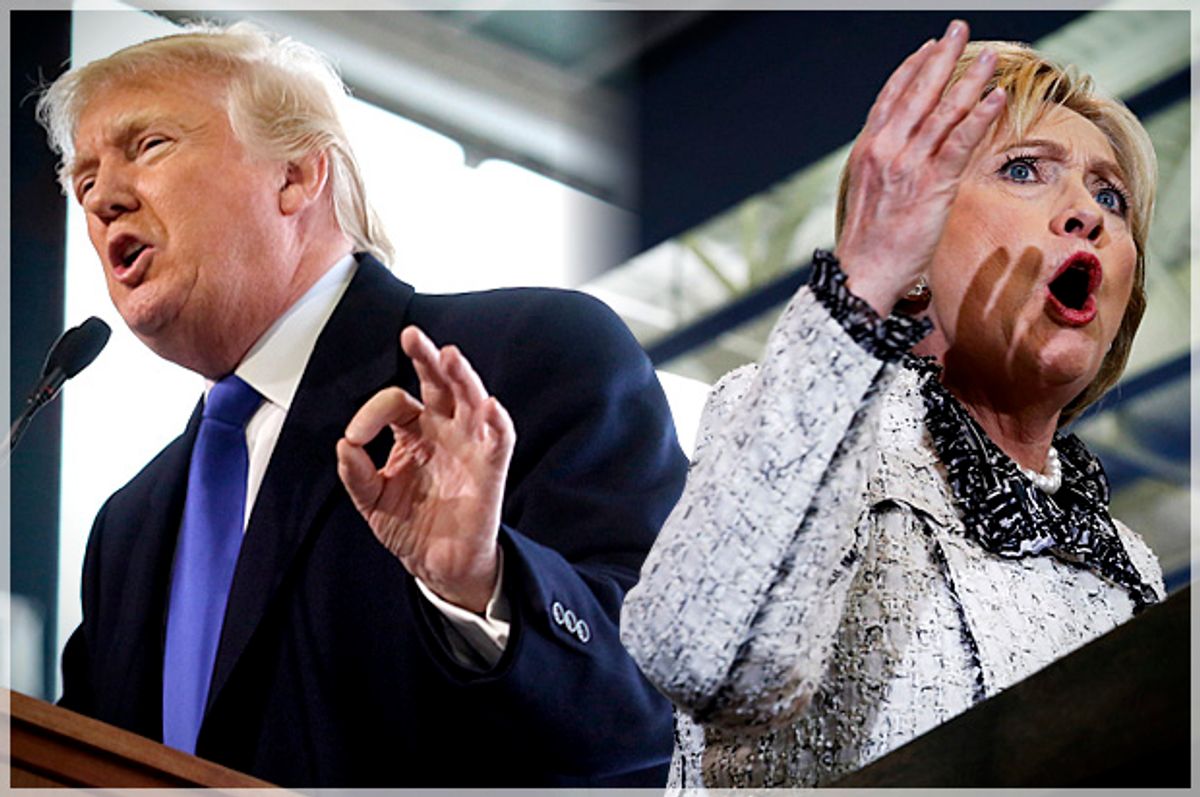With apologies to the great boxing announcer Michael Buffer: Let’s get ready to debaaaaaaaaaaate!
Tonight will see perhaps the most anticipated face-off between two presidential candidates in decades. So many questions! Will Donald Trump, needing to woo moderate voters, avoid the habit of insulting his opponent and the moderator that got him so much love from the GOP base in the primaries? Will Hillary Clinton be able to get under Trump’s leathery orange skin with some well-timed needling about his tax returns or the size of his hands? Will America’s liquor supplies last the evening?
Both campaigns have been spinning madly about the debate ahead of time, which on Friday resulted in leaks and well-planted stories in the New York Times and Politico, among others. The leaks have two purposes. One, they are intended to set low expectations ahead of time so that afterwards the campaigns can claim the candidates exceeded them. Two, the camps want to spook the other side into changing strategy, or lure it into a false sense of complacency.
For instance, if you believe sources from the Trump campaign, their candidate is barely engaging in any debate prep at all.
He has paid only cursory attention to briefing materials. He has refused to use lecterns in mock debate sessions despite the urging of his advisers. He prefers spitballing ideas with his team rather than honing them into crisp, two-minute answers. […]
Some Trump advisers are concerned that he underestimates the difficulty of standing still, talking pointedly and listening sharply for 90 minutes.
Whoa, the Clinton camp is apparently expected to assume, this is going to be a cakewalk. She’ll have a tougher time debating her granddaughter over whether to watch “Blue’s Clues” or “Sofia the First” during sleepovers in the Lincoln Bedroom.
Meanwhile, Clinton and her advisors would like Trump to think she’s coming after him like a drunken heckler at an open-mic night.
Hillary Clinton is determined to get under Donald J. Trump’s skin at Monday’s debate, and is testing attack lines to try to rattle him. […]
Mrs. Clinton is eager to play offense and try to get under his skin, by doing things like calling him “Donald” and questioning his net worth.
Darn it, the Trump campaign must be thinking, that wily Hillary Clinton is going to undo our weeks of effort to make our candidate look presidential and disciplined. All that time spent keeping him off of Twitter will be for nothing.
Note that all these leaks play off of established conventional wisdom about the candidates. Throughout the campaign, Trump has often seemed thin-skinned and inattentive to policy details. The way his opponents in GOP primary debates upset him was through insults or accusations of lying.
Clinton, on the other hand, has a reputation for being well-prepared and has a great deal of debating experience. Of course she is going to be so detail-oriented that she will even practice her zingers ahead of the debate until they sound spontaneous. The public already sees her as inauthentic, so if Trump wants to attack her authenticity, he will be wasting his time.
In these leaks lies the absurdity of trying to label either candidate as the winner or loser after it is over. There has been some talk about how the debates are the last chance for each candidate to define the other. But even for people who have only recently started paying attention to the election, public images are already mostly seared into the public mind. This perhaps was not the case in 1960 when John F. Kennedy and Richard Nixon squared off, but our current 16-month-long campaign, plus the advent of cable and the Internet, makes it especially true of Clinton and Trump, who have both been highly visible in the public eye for decades.
In a sense, the candidates are not really debating each other. They are debating their own public images, reinforcing how partisans think of them. If you already hate Clinton, you will see a programmed robot. If you hate Trump, you will see an unstable kook who doesn’t seem to understand the policies he’s espousing.
So the debates become about generating moments by which they will be long remembered. Think of Lloyd Bentsen slamming Dan Quayle or, more recently, Bernie Sanders’s contention that America was sick and tired of hearing about Clinton’s damn emails. Pundits then seize on these moments to explain to voters how each microcosmic moment crystalizes what we already think about the candidates — that Quayle is a callow young man or Sanders is a politician who cares about policy, not distracting scandals.
This is not to say the debates are worthless exercises. They can show us how candidates react under stress, for example. But they are an exercise in reinforcing images, not changing them. Barring some unforeseeable disaster — and I mean really unforeseeable, like Trump peeling off a mask to reveal he’s really Tom Hayden — the shape of this race is already set.
But it should at least make for an entertaining drinking game.

Shares